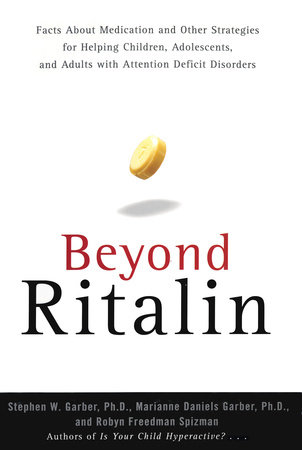Excerpt
Beyond Ritalin:Facts About Medication and Strategies for Helping Children,
1
EYE OF THE STORM
Confusion and Controversy Abound
Seven-year-old MICKEY ALVAREZ’s teachers suspected he might have an attention deficit hyperactivity disorder (ADHD) and referred him for testing. Like so many parents we’ve seen, the Alvarezes had read the headlines and had heard the terms before. Worried and confused about their son, they made their position very clear: “Don’t say the R word! We won’t consider giving him Ritalin.”
MR. AND MRS. COHEN were confused. After having been diagnosed with ADHD, their eleven-year-old son JERALD had responded well to Ritalin. His teachers reported that he was able to sit at his desk for longer periods of time, completed more assignments, and generally was more attentive in class. However, his test scores had not improved significantly, nor was he getting along that much better with his parents, siblings, or classmates. Fights were still a daily occurrence. “Ritalin is no magic pill as far as we’re concerned,” said Mr. Cohen.
JESSIE KELLEY was fifteen when she came to see us. She had been diagnosed as having an attention deficit disorder when she was eight years old, had taken Ritalin, and had done quite well. Her parents were concerned because she was having difficulty paying attention and keeping up with the workload in high school. “She’s a teenager now, so ADD isn’t a problem anymore. What do we do?” asked her mom.
MICHAEL PITT is an up-and-coming lawyer. He had to struggle through law school, but made it. Although a “go-getter” and great with the tiny details of contracts, he hasn’t made partner yet. When we met with him, he was beginning to wonder if he would. “I was in a meeting with an important client, discussing dealings that involve large sums of money. Next thing I know, I’m tracking a bird outside the window, and the client is asking me a question about I don’t know what. So I bluff and tell my assistant to have the answer in the morning. I’ve always been this way, but I’m wondering if I could be ADD. Would Ritalin work for me?” he asked us.
Four different individuals; four different stories; four points of view. Depending on why you selected this book, one of these stories is likely to be yours or that of someone you know and love.
You or your child may have tried medication and found that it wasn’t the magic pill you expected either. If it had some positive effects, there are probably still areas of your own behavior or your child’s that concern you. Or you may have been led to believe that your child would outgrow ADHD, but it didn’t happen. He’s still having the same old struggles, and you wonder if Ritalin is again a possible solution.
Perhaps only recently you have come to recognize your child or yourself in the now-familiar description of ADHD individuals. Could Ritalin be the answer to your struggles? Finally, there are those of you who don’t want to try any medication. You believe that your child has ADHD, but refuse to consider medication for any number of reasons.
The Alvarezes are a classic example of this last category. After they told us not to mention the R word, we asked why. It became clear quite quickly that, like many other parents, Mrs. Alvarez was concerned about “tranquilizing” her son. She also feared that Ritalin would stunt his growth and make him dependent on drugs. Although she didn’t quite say it this way, the vehemence of her response clearly indicated she had visions of Ritalin turning her son into a short, underweight drug addict.
A much larger group of parents, upon hearing their child has an attention deficit disorder, carefully consider the pros and cons before cautiously deciding to try medication. We understand the hesitation; as parents we understand the questions associated with giving any child medication for ADHD.
Once having begun medication for ADHD, more than two thirds of the group are likely to see some improvement in the child’s attention, overactivity, impulsiveness, or distractibility. However, over time parents are often surprised and disappointed, as the Cohens were, to discover that Ritalin doesn’t come close to solving all their child’s problems. Sometimes Ritalin initially makes such a profound difference in the life of their child that the repeated admonition, “Medication should never be the sole form of treatment for ADHD children,” falls on deaf ears. Without the inclusion of a range of nonpharmaceutical interventions and techniques, medication alone in many cases is doomed, if not to fail entirely, at least to prove disappointing.
Sadly, many parents take false comfort in the old thinking that most children will “outgrow” ADHD in adolescence. Unfortunately, we know now that many individuals do not outgrow ADHD. With time, the problematic symptoms may change, or the individuals may have independently hit upon a number of coping skills, but problems and challenges remain, often requiring new adjustments and new coping techniques. More than half of ADHD children will experience adolescence as Jessica Kelley did. Old problems remain and recur in the overstimulating, hormone-surging, action-packed high school years, and the old solutions no longer work. It’s never too late to try new nonpharmaceutical interventions or even medication. In fact, many ADHD teens respond well to medication, learn to accept responsibility for their actions, and ultimately find that the medication becomes crucial when they need to complete a lot of reading, or in situations demanding high attention, such as exams.
Finally, an increasing number of adults who have learned about ADHD are beginning to recognize themselves in the description. They may have struggled all their lives, may have been diagnosed with other learning disabilities, or may now be plagued by a compromised self-image based on experiences of failure and frustration. Every day we get calls from adults who, successful or struggling, wonder if medication might work for them.




